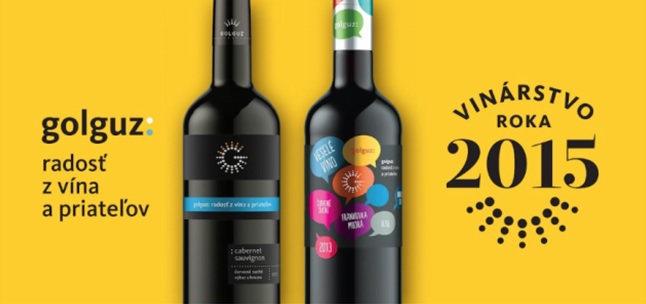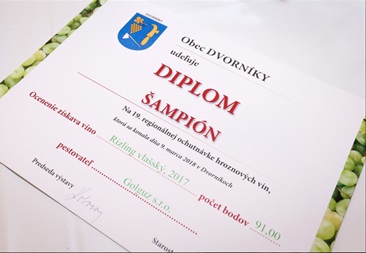Vinárstvom roka sa stal hlohovecký Golguz
Titul Vinárstvo roka 2015 si jednoznačným spôsobom vybojovalo vinárstvo Golguz, ktoré získalo najviac bodov zo všetkých.
Pôvodnou myšlienkou tejto súťaže bolo oceniť vinárstvo, ktoré získalo najviac ocenení na domácich a zahraničných súťažiach. Po niekoľkých zmenách sa nakoniec vyprofilovali súťaže, ktorých výsledky sa započítavajú do hodnotenia. Zo slovenských sú to Agrovíno Nitra, Vinné trhy Pezinok, Víno Tirnavia a Národný salón vín. Zahraničných súťaží je, samozrejme, viac a okrem vybraných sa do úvahy berú aj všetky poriadané pod záštitou O.I.V. Body je možné získať aj za prácu s médiami, počet hektárov vlastných vinohradov, degustačnú miestnosť či podnikovú predajňu.
Golguz dominoval skoro vo všetkých hodnotených parametroch, nielen kvôli tomu, že sme sa zúčastnili skoro všetkých nominačných a hodnotených zahraničných súťaží, ale hlavne preto, že sa nám na nich výnimočne darilo a zbierali sme väčšinou zlaté medaily. Za týmto úspechom treba hľadať niekoľko dôležitých faktorov. Okrem skúsených technológov sa v Golguze na zvyšovaní kvality vín podieľa aj postupná renovácia technologických zariadení. Pekným príkladom je Rulandské modré 2013, ktoré vyzrievalo v nových kvalitných barikových sudoch, ktoré odovzdali tomuto vínu nezameniteľný rukopis. Nielen toto, ale aj ostatné vína by však bez fantastickej suroviny vznikali asi len veľmi ťažko. „Perfektne vyzreté hrozno z našich vinohradov je absolútny základ tohto úspechu,“ vysvetľuje s nadšením generálny riaditeľ vinárstva Golguz Miloš Holík. Základ budúcej úrody sa rodí už počas zimného rezu, počas ktorého sa ťažne nastrihajú tak, aby sa kry príliš nepreťažovali. V ročníku 2014 sme mali priemernú úrodu 5,96 ton hrozna z hektára. Možno by niekto namietal, ale aj v tejto nie práve ideálnej sezóne, sme mali v Golguze aj minulý rok priemer na hektár vyšší iba o 1,5 tony, čo na Slovensku vôbec nebýva zvykom. V pivnici pracujeme bez kompromisov s cieľom dosiahnuť čo najvyššiu kvalitu. Dokonca aj v ročníku 2014 sme si dokázali dopestovať hrozno vo veľmi dobrej kvalite a vyrobiť vína, ktoré sa nestratili ani na medzinárodnej úrovni. „Pri ročníkoch, keď tlak hubových chorôb nie je až taký silný, nie sú rozdiely až také badateľné, ale pri náročnejších rokoch sa rozdiely zvýraznia a vtedy sa ukáže ako sa vo vinici hospodárilo roky predtým,“ dodáva technológ Marek Kovár.
Dôležitú úlohu pri kvalite vstupnej suroviny zohráva aj poloha, na ktorej sú vysadené naše vinohrady. Vápenaté podložia, dostatok slnečného svitu a stály vánok vytvárajú doslova ideálne podmienky. Dokonca pri výsadbe Rulandského bieleho preteká malá potok, ktorý sa vlieva do Váhu a vytvára fantastickú mikroklímu čo každoročne potvrdzujú vína vyrobené z hrozna z tejto lokality. Za všetky spomeňme aspoň ľadové Rulandské biele 2011, ktoré sa minulý rok stalo víťazom vo svojej kategórii v NSV.
Špecifický hlohovecký terroir šteklil nosy nielen našim ale aj zahraničným degustátorom, pretože všetky naše vína, ktoré sa minulý rok zúčastnili či už našich alebo zahraničných súťaží, skončili vždy v prvej tretine a každé z nich skončilo na medailovej pozícii. Takto vyrovnaná kolekcia bola ďalším z faktorov, ktoré vyniesli Golguz na pomyselný Olymp a musíme dodať, že právom. Jedným dychom však musíme poznamenať, že za týmto úspechom môžeme vďačiť najmä pinotovým odrodách, ktorým sa v Hlohovci náramne darí. Veď z desiatich vín, ktoré sa dostali medzi najlepšiu stovku vín v NSV 2015 až sedem bolo z tejto rodiny.
Trúfame si povedať, že v Golguze to máme aj tento rok výborne rozbehnuté. Keby stanovy súťaže povolili víťazovi z ostatného ročníka uchádzať sa znovu o titul, Golguz by bol určite veľmi horúcim favoritom.
Budeme sa snažiť, aby sme nesklamali našich zákazníkov a aby bolo víno rovnako dobré a aby prinášalo radosť…
Golguz: radosť z vína a priateľov





